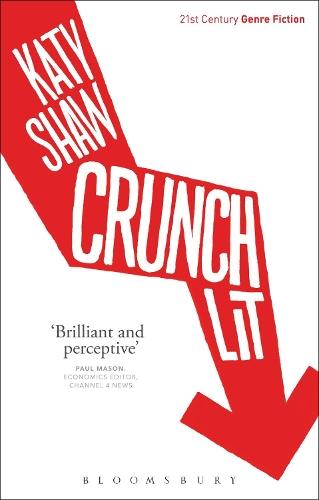Overview
The financial crisis of 2008 quickly gave rise to a growing body of fiction: ""Crunch Lit"". These 'recession writings' take the financial crisis as their central narrative concern and explore its effects on consumer culture, gender roles and contemporary communities. Examining a range of texts including Sebastian Faulks' A Week in December, Adam Haslett's Union Atlantic, and John Lanchester's Capital, this book offers the first wide-ranging guide to these new millennial writings.
Full Product Details
Author: Dr Katy Shaw (Principal Lecturer in Contemporary Literature, Leeds Beckett University, UK)
Publisher: Bloomsbury Publishing PLC
Imprint: Bloomsbury Academic
Dimensions:
Width: 13.80cm
, Height: 1.50cm
, Length: 21.60cm
Weight: 0.268kg
ISBN: 9781472510068
ISBN 10: 1472510062
Pages: 208
Publication Date: 22 October 2015
Audience:
College/higher education
,
Professional and scholarly
,
Tertiary & Higher Education
,
Professional & Vocational
Format: Paperback
Publisher's Status: Active
Availability: Manufactured on demand

We will order this item for you from a manufactured on demand supplier.
Reviews
Shaw's study underlines the importance of cultural production as intervention as well as education when negotiating complex structures such as the global financial system ... [It] spotlights a wide variety of issues and interpretations. Anglistik In a brilliant and perceptive analysis, Shaw shows how, when crisis hit, novelists and dramatists understood quicker and better than economists the true depths of it, and its challenge to the way we tell our own stories. Paul Mason, Economics Editor, Channel 4 News Crunch Lit is a significant, wide-ranging and energetic book that makes clear the literary responses to the global economic catastrophe which has devastated so many. Lucidly written, it establishes a genre and its context and, a model of literary criticism, it explores the meaning of the 'credit crunch'. It should be read by everyone teaching or researching contemporary literature, and probably by everyone working in finance, too. Robert Eaglestone, Professor of Contemporary Literature and Thought at Royal Holloway, University of London, UK Comprehensive, thorough and insightful. With impressive economy of style, Crunch Lit defines this emerging genre, and considers the impact of financialisation on our thought and culture. A valuable book for anyone interested in the social novel in the twenty-first century. Richard Benson, author of The Valley
In a brilliant and perceptive analysis, Shaw shows how, when crisis hit, novelists and dramatists understood quicker and better than economists the true depths of it, and its challenge to the way we tell our own stories. Paul Mason, Writer and Channel 4 News Economics Editor Crunch Lit is a significant, wide-ranging and energetic book that makes clear the literary responses to the global economic catastrophe which has devastated so many. Lucidly written, it establishes a genre and its context and, a model of literary criticism, it explores the meaning of the 'credit crunch'. It should be read by everyone teaching or researching contemporary literature, and probably by everyone working in finance, too. Robert Eaglestone, Professor of Contemporary Literature and Thought at Royal Holloway, University of London, UK Comprehensive, thorough and insightful. With impressive economy of style, Crunch Lit defines this emerging genre, and considers the impact of financialisation on our thought and culture. A valuable book for anyone interested in the social novel in the twenty-first century. Richard Benson, author of The Valley
Author Information
Katy Shaw is Principal Lecturer in Contemporary Literature at Leeds Beckett University, UK. Her previous publications include David Peace: Texts and Contexts and Mining the Meaning: Cultural Representations of the 1984-5 UK Miners' Strike.




